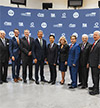Birmingham's Economy Strengthens, Largely Unaffected by County Bankruptcy
Summer 2012
Most businesses in Birmingham, Jefferson County, and the seven-county metropolitan statistical area (MSA) have largely been unaffected by the looming bankruptcy (likely to be the largest municipal bankruptcy in U.S. history). Those that have been hurt the most are vendors that work directly with the Jefferson County Commission, which has greatly reduced its work force and is paying $5.5 million monthly to its creditors as it negotiates the final settlement.
Overall, however, the local economy has stayed fairly steady and is showing some growth. "It's slower and smaller than we'd like, just as it is for many communities in the country," says Rick Davis, senior vice president of the Birmingham Business Alliance. "But there are some positive signs. For example, Birmingham was the only MSA in Alabama (and one of only a few in the Southeast) to see an increase in manufacturing jobs in 2011, compared to the previous year."
Growing Sectors
This gain is largely driven by the resurgence in the automotive industry. For Birmingham this includes the nearby Mercedes-Benz and Honda manufacturing plants, and the many vendors that have located in the area to supply them. This sector continues to expand rapidly to meet the increasing demand for new vehicles. Other sectors gaining momentum are finance, insurance, metals, advanced manufacturing, and healthcare - including back-office operations, call centers, and logistics and transportation for support.
"Our discussions with site location consultants and others leave us feeling extremely positive about attracting more data centers," says Davis. "We have available land, extremely reliable power that is competitively priced, a modern telecommunications infrastructure, and a skilled, motivated, educated work force. This combination of assets definitely keeps us in the running for new data center operations."
High Tech: An Undiscovered Gem
As important as traditional industries are, a city must attract knowledge-based companies to create high-tech clusters, provide high-paying jobs, and stay competitive in this rapidly evolving global economy.
Last September Davis and his economic development staff decided to conduct an asset inventory of the region, specifically targeting technology-based companies. His team only included businesses that were engaged in technology development or provided a service based on technology development. They were astounded to find 773 companies that met these requirements.
"That's almost double the number that you'd find in Huntsville," says Davis. "As you drill down into these high-tech companies, you find spectacular levels of research and development going on at the University of Alabama-Birmingham and other biotech companies."
Birmingham also has one of the leading high-tech incubators in the country: Innovation Depot. With 150 graduate companies and a 140,000-square-foot facility, Innovation Depot is the largest technology business incubator in the Southeast. The National Business Incubation Association named it the 2011 Dinah Adkins Incubator of the Year in the technology-focus category; in October 2011 CNNMoney identified Innovation Depot as one of seven hottest start-up incubators in the nation.
Over the last four years Innovation Depot has generated more than $1 billion in economic impact in the Birmingham region. "The accomplishments of all our high-tech companies are shining a positive light on this sector," says Davis. "This starts to change the conversation about Birmingham, and people's perceptions about what can be done here."
Moving Ahead
Davis is satisfied with the level of project activity in Birmingham. "It could be better," he acknowledges, "but I think we've all been spoiled with growth rates that often climbed into double digits, and now we'll have to get used to growth rates in the 2-3 percent range for a while."
The city continues to look for opportunities to leverage its legacy work force in metals, manufacturing, healthcare, finance, insurance, transportation, and distribution and logistics. "Our life sciences sector, which includes some very special advances in biotechnology, is already bearing fruit, as is our information technology base," Davis adds.
But how does the bankruptcy affect the thinking of potential companies that are interested in coming to town? The reaction is varied, according to Davis. "One company, when we explained the bankruptcy, said it was of no concern to them at all," he says. "Another company headquartered elsewhere, but with significant operations here, wasn't even aware of it."
Davis points out that the view of many corporate leaders is that bankruptcy is a tool for moving a company (or in this case, a county) from a negative position to a positive position. "It's a process," he says. "In the majority of cases entities that file for bankruptcy often emerge in a much stronger financial condition than before the bankruptcy."
Being the state's most populated county, Jefferson County is Alabama's second-largest governmental entity, behind state government. Birmingham is the largest municipality in the state and is located in Jefferson County, but beyond that, the two governments are not linked. Birmingham's municipal bond rating is AA+ - evidence that the city is managing its resources in a smart and effective way.
"We will continue to build relationships with our key stakeholders within the state and certainly our region," says Davis. "Just as important is to develop and nurture relationships with corporate executives, site location consultants, and others who drive the location process. Birmingham has a lot to offer and these relationships will be crucial to our future success."
Project Announcements
Australia-Based Aquatic Leisure Technologies Group Plans Opp, Alabama, Manufacturing Operations
12/11/2025
Southwire Expands Heflin, Alabama, Production Operations
11/17/2025
Fratco Establishes Fort Payne, Alabama, Manufacturing Operations
11/12/2025
SmartWiz Expands Birmingham, Alabama, Headquarters Operations
11/01/2025
Glaukos Plans Huntsville, Alabama, Manufacturing-Research Operations
10/18/2025
Southern Ionics Expands Tuscaloosa, Alabama, Manufacturing Operations
10/07/2025
Owens Corning Plans Prattville, Alabama, Shingle Manufacturing Operations
09/27/2025
Georgia-Pacific Expands Monroe County, Alabama, Cellulose Mill Operations
09/14/2025
Loftis Steel & Aluminum Expands Decatur, Alabama, Fabrication Operations
09/01/2025
Master Boat Builders Expands Coden, Alabama, Shipbuilding Operations
09/01/2025
Choice Fabricators Expands Rainbow City, Alabama, Production Operations
08/29/2025
Performance Drone Works Establishes Huntsville, Alabama, Manufacturing Operations
08/27/2025
L3Harris Technologies Expands Huntsville, Alabama, Manufacturing Operations
08/12/2025
Contour Fabrications and Mechanical Plans Heflin, Alabama, Manufacturing Operations
08/11/2025
Most Read
-
The Workforce Bottleneck in America’s Manufacturing Revival
Q4 2025
-
Rethinking Local Governments Through Consolidation and Choice
Q3 2025
-
Data Centers in 2025: When Power Became the Gatekeeper
Q4 2025
-
Tariff Shockwaves Hit the Industrial Sector
Q4 2025
-
Investors Seek Shelter in Food-Focused Real Estate
Q3 2025
-
America’s Aerospace Reboot
Q3 2025
-
The Permit Puzzle and the Path to Groundbreaking
Q3 2025



